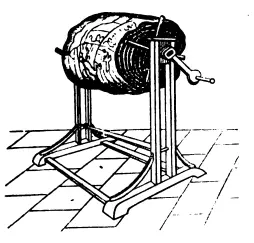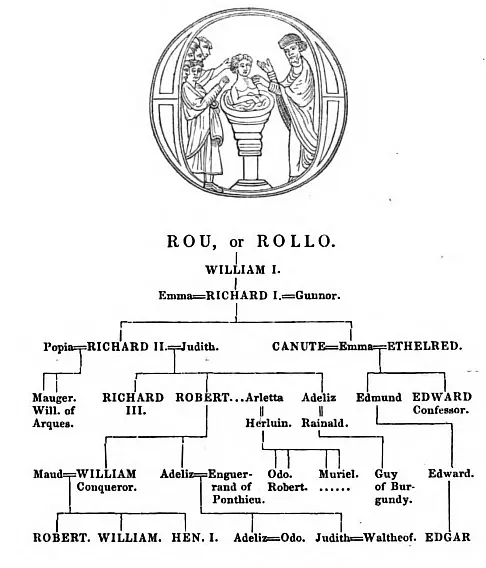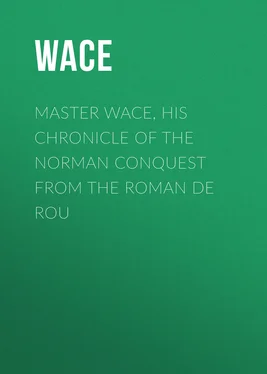Wace - Master Wace, His Chronicle of the Norman Conquest From the Roman De Rou
Здесь есть возможность читать онлайн «Wace - Master Wace, His Chronicle of the Norman Conquest From the Roman De Rou» — ознакомительный отрывок электронной книги совершенно бесплатно, а после прочтения отрывка купить полную версию. В некоторых случаях можно слушать аудио, скачать через торрент в формате fb2 и присутствует краткое содержание. Жанр: foreign_prose, История, foreign_edu, foreign_antique, на английском языке. Описание произведения, (предисловие) а так же отзывы посетителей доступны на портале библиотеки ЛибКат.
- Название:Master Wace, His Chronicle of the Norman Conquest From the Roman De Rou
- Автор:
- Жанр:
- Год:неизвестен
- ISBN:нет данных
- Рейтинг книги:4 / 5. Голосов: 1
-
Избранное:Добавить в избранное
- Отзывы:
-
Ваша оценка:
- 80
- 1
- 2
- 3
- 4
- 5
Master Wace, His Chronicle of the Norman Conquest From the Roman De Rou: краткое содержание, описание и аннотация
Предлагаем к чтению аннотацию, описание, краткое содержание или предисловие (зависит от того, что написал сам автор книги «Master Wace, His Chronicle of the Norman Conquest From the Roman De Rou»). Если вы не нашли необходимую информацию о книге — напишите в комментариях, мы постараемся отыскать её.
Master Wace, His Chronicle of the Norman Conquest From the Roman De Rou — читать онлайн ознакомительный отрывок
Ниже представлен текст книги, разбитый по страницам. Система сохранения места последней прочитанной страницы, позволяет с удобством читать онлайн бесплатно книгу «Master Wace, His Chronicle of the Norman Conquest From the Roman De Rou», без необходимости каждый раз заново искать на чём Вы остановились. Поставьте закладку, и сможете в любой момент перейти на страницу, на которой закончили чтение.
Интервал:
Закладка:
There are historical traces of attempts under that monarch, to form a sort of norman Domesday, for purposes, no doubt, of revenue. It would seem that this design was resisted, and perhaps was only imperfectly executed in the form we find the existing roll. Philip Augustus afterwards caused much more complete registers of the Fœda Normannorum to be formed. Transcripts of these are in the King's library, and at the Hotel Soubise, and partially in the Liber-niger of Coutances which M. de Gerville quotes. The 'Fœda Normannorum' in Duchesne seems part of a document of this later period.
While this volume was in progress, and after the notes had been prepared, the 7th and 8th vols, of the 'Mémoires des antiquaires de Normandie' reached the translator. They contain a calendar and analysis of a vast number of charters to religious houses within the department of Calvados, and furnish a perpetual recurrence of the names of the early owners of the principal fiefs in that district.
Another great addition has at the same time been made to the stock of materials for the illustration of Wace, in the publication at Rouen of the first vol. of the 'Chroniques Anglo-Normandes,' comprising such portions of Gaimar, of the Estotre de Seint Ædward le Rei, of the continuation of Wace's Brut d'Angleterre, and of Benoit de Sainte-More, as relate to the norman conquest. They had all been previously resorted to in MS. and more copious extracts would have been added, if they had not been made so accessible by the publication referred to. Its continuation will add other valuable historic documents relative to the period in question.
For the graphic illustrations of the volume recourse has been had to a few of the illuminations of the beautiful Cambridge MS. of the Estoire de Seint Ædward le Rei. Several other subjects, that appeared appropriate, have been added from various sources. But the principal storehouse of the illustrations has been that noble and exquisite relic of antiquity, the tapestry of the cathedral of Bayeux. To this series of pictures the chronicle of Wace, (a prebend of that church, as already observed,) [Pg xxviii]would almost seem to have been intended as what, in modern times, would be called the letter press. The controversies long carried on, as to the age of this interesting piece of workmanship, and as to the identity of the Matilda to whom it may owe its origin, need not be reviewed here. The reader will find in Ducarel, in the observations of M.H.F. Delauney annexed to the French translation of Ducarel, in the Archæologia, in Mr. Dawson Turner's Letters, Dr. Dibdin's Tour, and other modern works, ingenious and ample discussions upon what is known or conjectured on the subject.
Speculations have been hazarded, with the view of testing the era of the tapestry by Wace's supposed want of agreement with the story of the former. It seems assumed that this variance would not have occurred, had the tapestry been in existence when he wrote. It is not clear, however, that there is any material variance; but if there be, it is surely somewhat hasty to assume on that account, either that Wace preceded, or that he was unacquainted with the worsted chronicle. He obviously sought his authorities in various quarters; and he might very well have known and rejected the testimony of the tapestry, on any matter of fact regarding which there were conflicting accounts. It is very curious that two such monuments of antiquity should be connected with the same church; but it is left to others to speculate whether this was accidental, or what influence, if any, the work of either party had on that of the other.
Lastly, a small map of Normandy has been added, for the illustration of Wace's work and of the accompanying notes. With the exception of the leading monastic establishments, (which were considered a convenient addition, though many of them were founded at a later period), little is shown upon the map beyond the towns and fiefs introduced by Wace; and these are laid down so far as the means of knowledge or probable conjecture presented themselves. In the execution of this little map, no pretension is made to strict geographical or even chronological accuracy; neither has uniformity been preserved in the language of the names; but such as it is, it will probably be found sufficiently full and precise to answer the general purpose for which it is designed.


PROLOGUE CONCERNING THE AUTHOR OF THIS BOOK, SETTING FORTH HIS INTENT AND DEGREE
To commemorate the deeds, the sayings, and manners of our ancestors, to tell the felonies of felons and the baronage of barons 3 3 The list in the printed 'Chronique de Normandie,' though very inaccurately given, is based upon Wace's. It may be found much more correctly in the fine MS. Chronicle of Normandy, (which ought to be printed.) in the British Museum, Bibl. Reg. 15 E. vi. fol. ccccx.
, men should read aloud at feasts the gests and histories of other times; and therefore they did well, and should be highly prized and rewarded who first wrote books, and recorded therein concerning the noble deeds and good words which the barons and lords did and said in days of old. Long since would those things have been forgotten, were it not that the tale thereof has been told, and their history duly recorded and put in remembrance.
Many a city hath once been, and many a noble state, whereof we should now have known nothing; and many a deed has been done of old, which would have passed away, if such things had not been written down, and read and rehearsed by clerks.
The fame of Thebes was great, and Babylon had once a mighty name; Troy also was of great power, and Nineveh was a city broad and long; but whoso should now seek them would scarce find their place.
Nebuchadnezzar was a great king; he made an image of gold, sixty cubits in height, and six cubits in breadth; but he who should seek ever so carefully would not, I ween, find out where his bones were laid: yet thanks to the good clerks, who have written for us in books the tales of times past, we know and can recount the marvellous works done in the days that are gone by.
Alexander was a mighty king; he conquered twelve kingdoms in twelve years: he had many lands and much wealth, and was a king of great power; but his conquests availed him little, he was poisoned and died. Cæsar, whose deeds were so many and bold, who conquered and possessed more of the world than any man before or since could do, was at last, as we read, slain by treason, and fell in the capitol. Both these mighty men, the lords of so many lands, who vanquished so many kings, after their deaths held of all their possessions nought but their bodies' length. What availed them, or how are they the better for their rich booty and wide conquests? It is only from what they have read, that men learn that Alexander and Caesar were. Their names have endured many years; yet they would have been utterly forgotten long ago, if their story had not been written down.
All things hasten to decay; all fall; all perish; all come to an end. Man dieth, iron consumeth, wood decayeth; towers crumble, strong walls fall down, the rose withereth away; the war-horse waxeth feeble, gay trappings grow old; all the works of men's hands perish 4 4 A much more correct copy is printed in the french translation of Ducarel, published in 1823.
. Thus we are taught that all die, both clerk and lay; and short would be the fame of any after death, if their history did not endure by being written in the book of the clerk.
Интервал:
Закладка:
Похожие книги на «Master Wace, His Chronicle of the Norman Conquest From the Roman De Rou»
Представляем Вашему вниманию похожие книги на «Master Wace, His Chronicle of the Norman Conquest From the Roman De Rou» списком для выбора. Мы отобрали схожую по названию и смыслу литературу в надежде предоставить читателям больше вариантов отыскать новые, интересные, ещё непрочитанные произведения.
Обсуждение, отзывы о книге «Master Wace, His Chronicle of the Norman Conquest From the Roman De Rou» и просто собственные мнения читателей. Оставьте ваши комментарии, напишите, что Вы думаете о произведении, его смысле или главных героях. Укажите что конкретно понравилось, а что нет, и почему Вы так считаете.












